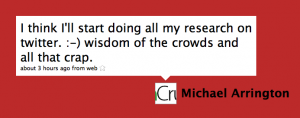 I was over at Converseon today and told the crew that I was considering a post on the time sync that is Twitter (and pretty soon, FriendFeed).
I was over at Converseon today and told the crew that I was considering a post on the time sync that is Twitter (and pretty soon, FriendFeed).
I know. I know. Twitter tweets are only 140 characters, so how much of a distraction could it be? A lot. Wasn’t it TechCrunch’s Mike Arrington who today elicited hundreds of comments on his A-List blog after posting just a single word – Twitter?
I usually have it running in the background as I’m trying to get some actual income-producing work done. And from time to time, I’ll jump in the fray or observe from afar a cool gadget or possible lead for a blog post. (@DaveWiner’s tweet tonight provided one that I’ll write about tomorrow.)
Some folks appear to have nothing better to do than live and breathe Twitter all day every day. Are they getting paid-per-tweet? Perhaps they lack bosses or clients? I mean this blogger barely has time to pop out a blog post, let alone keep up with the endless dialogue string on this most quirky platform.
The FT today suggested that some of the Web 2.0 gestalt is strangely reminiscent of the dot-coms when it comes to producing revenue. In a piece mostly about widgets, Chris Nuttall and Richard Waters wrote:
“The difficulties of the widget companies point to a broader problem that has beset the crowded Web 2.0 landscape. The wave of “social media” companies that has arisen since the middle of this decade, many of them characterised by user-generated content and new forms of communications, has changed the way millions of people interact and entertain themselves online. Yet, by their nature, these new forms of behaviour are proving extremely difficult to turn into hard cash.”
The piece concluded:
“It is only natural, he adds, that the winners in this race for audience attention will end up with “mass adoption and user attention before you necessarily recognise where the revenue comes from.” That was the thinking behind a few winners – and many losers – from the first generation of consumer dotcoms at the end of the 1990s. Something similar looks in store for Web 2.0.”
Steve and Heather update their homage to Steve Rubel from three years ago in a piece called “Beyond Blogs” from the current issue of Business Week. The two take a less myopic look at the social media universe. They too, however, conclude:
Even if the bubble bursts—and we predict it will—the power of social media to transform our businesses and society will only grow.
Both are most worthwhile reads, as are, I confess, the 150 pontificators I follow on Twitter.